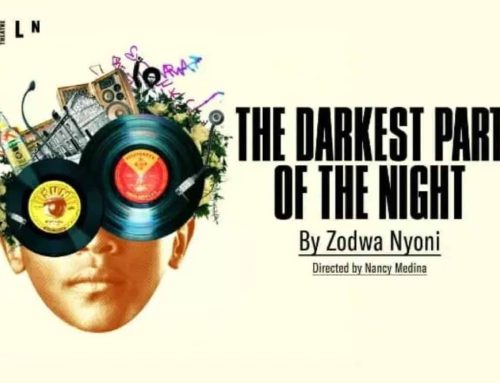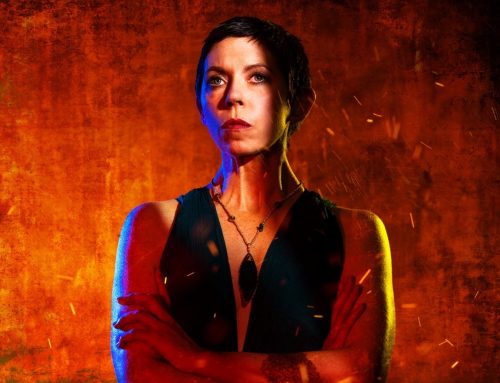Nicholle Cherrie’s powerhouse central performance and some clever writing by Chinonyerem Odimba flatters a story that is unecessarily thin on characterisation.
8 April 2022
Black Love begins with a poetic and fairly fruity elegy to the Vagina, sung to a seductive and silky beat, and communicated by the lead character to generations of her black sisters by means of mystical crystals and incense sticks. As a way of establishing the writer’s intent, opening scenes rarely come more note-worthy than this.
And there is no doubt that writer / director Chinonyerem Odimba has a potent and compelling message she wants to get across. Black women are rooted in generations of strength and nourished in a culture gifted with a prodigious capacity for love. They must demand the right to be listened to, heard, and respected on their own terms. It is an attractive message, reinforced by a set made mainly from pastiche loudspeakers, that certainly resonated with an enthusiastic and engaged Kiln Theatre audience.
No writer could wish for a better actor to carry her message than the delightful and captivating Nicholle Cherrie, who delivers an unforgettable dynamo of a performance as the strident, loud-mouthed central character, Aurora. Cherrie lives and breathes the role, turning Aurora into a kind of one-woman whirlwind laying waste to whatever opposition she encounters.
Happily ensconced in a flat-share with similarly cosmically named brother Orion, no-nonsense Aurora, or Ru to her friends, spends her days communing with crystals and her Friday nights clubbing, high as a kite on magic mushrooms. Her relationship with struggling-actor Orion is central to her life – the bond between brother and sister cemented by shared grief over the recent loss of their mother and conflicted memories of a philandering father.
Into this affectionate ménage à deux strides Louisa, an ambitious white girl with a saviour complex who sets her eyes on the love-stuck Orion and sets out to fashion him into the kind of black man she thinks he should be. Predictable sparks fly between the two woman. Orion, who is meantime struggling to be heard by the director of the play he has been cast in, has some sharp choices to make about who he is and what he wants.
The story, told in the fashionable combination of dialogue, music, verse, and dance, is effectively laid out by Odimba, who has evident skills as a director. At one level Black Love is about the bonds that bind siblings together. At another it is about how being true to one’s heritage and values is core to self-realisation. The problem here is not with the story, thin though it sometimes is, but with the characters.
Louisa is woefully under-written, with no obvious motivation and no backstory to speak of. As a cipher for white privilege, I suppose she made sense, but as a character she was one-dimensional and dolefully unconvincing. Beth Elliot did her best with the role but deserves more to work with.
Aside from being a fiery, rave-loving, mushroom-munching, advocate for black women, I never felt I understood who Aurora was or what she wanted. The character began and ended in the same place, and her lack of empathy left me wondering if the writer was really convinced in her creation. Only Orion’s story arc really felt real, aided by a solid and likeable performance from Nathan Queely-Dennis.
Black Love is worth seeing for its positive message, quality writing and directing, and outstanding central performance, but it is manifestly not without flaws as a piece of drama.
Duration: 95 mins. No interval.
Writer / Director Chinonyerem Odimba
Cast
Aurora Nicholle Cherrie,
Orion Nathan Queely-Dennis
Louisa Beth Elliot
Full Disclosure: I paid full box-office price for the ticket.






